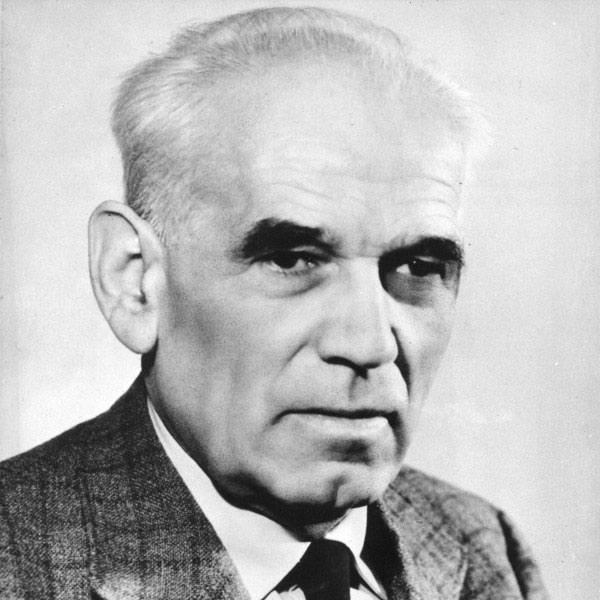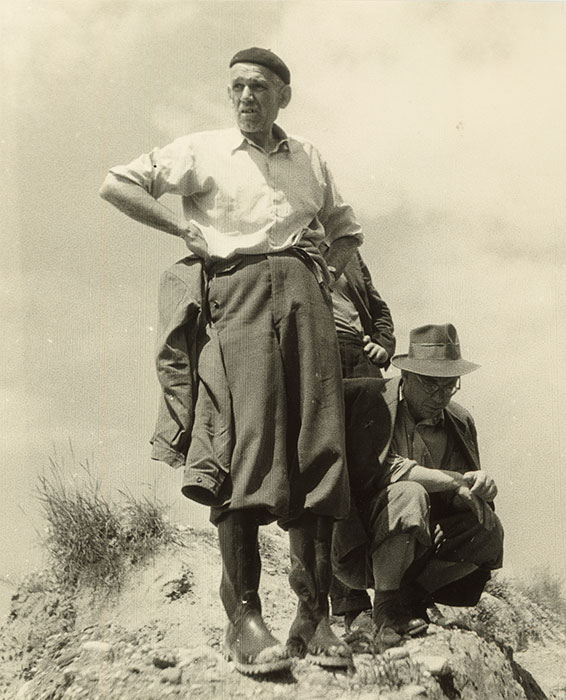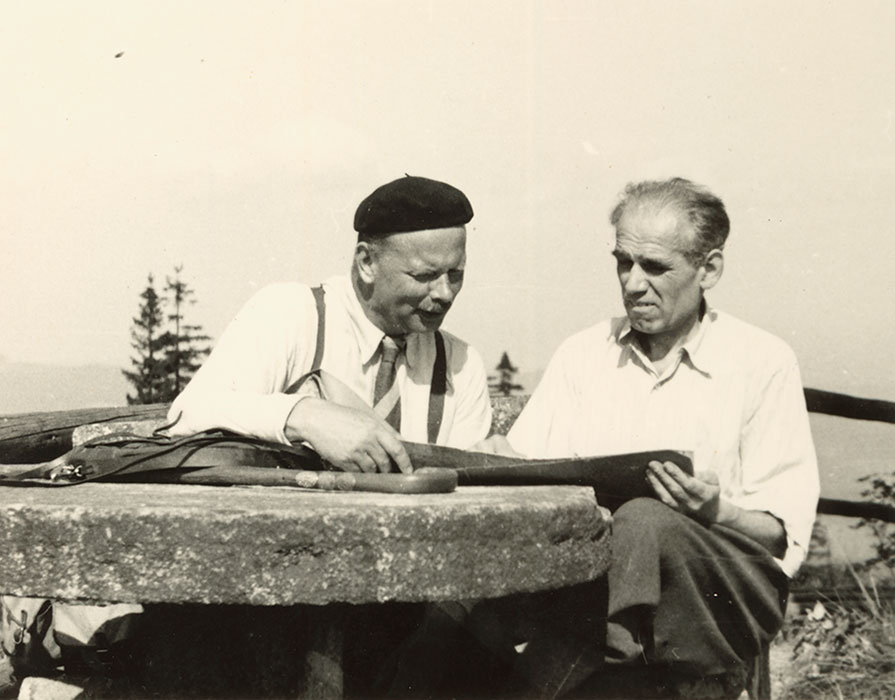Academician Quido Zaruba

Academician Quido Zaruba is an internationally acknowledged founder of engineering geology, a scientist with wide range of knowledge, the first president of International Association of Engineering Geology and the Environment and an excellent pedagogue who devoted his life to applied engineering geology and whose name will remain well-known in history of technical and geological sciences
Quido Zaruba, an internationally acknowledged founder of engineering geology
Quido Zaruba founded the field of engineering geology in the then Czechoslovakia in the 1920s. He had a wide range of knowledge in both design and implementation of engineering projects. For twenty years, he worked as a construction engineer at the Zaruba – Pfeffermann family company which participated in the construction of significant buildings, hydraulic structures and especially railway lines and tunnels. In 1926, Quido Zaruba established a geological research department in the company, which became the department of Stavoprojekt after the Second World War and then became the well-known Stavební geologie, today´s SG Geotechnika.
He established the first engineering geological department in the Czech Republic
The department had a clearly defined scope of work since the beginning. It specialized in determining the geological conditions, especially the properties of rocks and soils, solving issues arising as a result of the engineering work intervention in the natural state of rock massif, including the utilization of soils and rocks as a building material. Already in 1926, the department accomplished five large research tasks, the most important was a survey for the Tobacco Directing building in Slezská street in Vinohrady. In following years, a survey for the State Gallery in Kampa, a large building of the Transport Companies on the Vltava embankment in Holešovice, a survey for the building of the Supreme Audit Office in Letná, today´s Ministry of the Interior, of for the Technical Museum building in Letná.
From the pioneering beginnings in the 1920s to the development of a multidisciplinary field
In May 1945, Quido Zaruba was commissioned to re-establish the Geological Institute at the Czech Technical University in Prague. He was duly appointed professor in the following year and later the head of the Department of Geology and Building Foundations. Since then, he fundamentally influenced the development of a new discipline, engineering geology, throughout the then Czechoslovakia and in Europe. In his lectures, he developed a completely new concept of practical geology applied in civil engineering which gradually evolved in an independent scientific discipline, the so-called engineering geology. He professionally influenced and educated several dozen engineering geologists through his lectures, supplemented by interesting examples from practice. Due to his contributions, the engineering geology has become a significant multidisciplinary field.
Zaruba´s conception of engineering geology in civil engineering has always been and will always be relevant
As Quido Zaruba promoted, the output of engineering geological survey is not only about geological profile with the basic properties of the present soils and rocks, but it is also necessary to study and predict the deformation response of the rock massif to diverse variants of engineering interventions to its natural state. He insisted on the necessity of the application of new geotechnical specializations such as soil and rock mechanics, laboratory and field testing, monitoring, petrography, geophysics and last but not least, numerical modelling of soil and rock behaviour under different conditions. He also emphasized, it is crucial to understand natural processes regardless applying the new engineering approach based on new disciplines. The natural processes always determine the properties of soils and rocks and their future response to changes in the original conditions. This original contribution to engineering geology and geotechnics has always been and will always be relevant.
Zaruba was a founder of the multidisciplinary field of engineering geology as well as he participated in the most important engineering structures built after the Second World War
There is not a single important dam where he would not participate as a consultant of engineering geological solutions. He focused on geology of transport structures, bridges, and tunnels. He was a consultant in the preparation and construction of Prague metro. However, the main field included landslides and slope movements of all types. He experienced them primarily on his construction sites, especially railways, but also dams and other construction sites throughout the Czech Republic. He soon became a specialist in this field, solving significant cases of these phenomena in our country and abroad. Some of his work from his late life intervenes in a completely innovative way in environmental protection, even before the environmental issues began to be emphasized. He published over 240 scientific papers, textbooks and monographs that shaped the current multidisciplinary field of engineering geology. His monograph about the geological conditions of inner Prague, based on his own knowledge of building sites in the city, is still the essential work for geotechnical assessing of construction sites in Prague.
He achieved international recognition and became the first president of the International Association of Engineering Geologists
Zaruba was internationally acknowledged all over the world. He received extraordinary success and recognition of this work already during his life. He was well known abroad for his numerous study visits and international congresses in the USA, Italy, Germany, Poland, Switzerland, Sweden, Spain, Austria, and the United Kingdom. His contribution to the formation of a new discipline and its importance was confirmed by his election as president of the International Association for Engineering Geology and the Environment (IAEG) at its founding meeting at the World Geological Congress in 1968 in Prague. During his presidency in 1968–1972, the IAEG reached successful development. Professor Arnould described the importance of academician Quido Zaruba at the Prague Geotechnical Days in 1999: “The first steps of the International Organization for Engineering Geology (IAEG) are associated with the great role of professor Zaruba and his Czechoslovak colleagues. It was clear that Prague was then a privileged scientific centre of engineering geology, and that with the absence of the events associated with 1968, this role could have been even greater. Professor Zaruba was a great scientist, an excellent practical engineer, a dazzling honest person, a very educated, always reliable friend. When working together, he was always able to make a creative and working atmosphere.”
The prestigious Quido Zaruba Awards maintain awareness of the importance of the Czechoslovak academician on an international scale
SG Geotechnika, a company based on Quido Zaruba´s legacy, annually initiates awarding the Quido Zaruba Award for Young Engineering Geologists and Geotechnical Engineers for the most valuable and interesting works in the field and the Quido Zaruba Gold Medal for lifelong contribution in engineering geology and geotechnics. Both awards commemorate the importance of the founder of engineering geology and support further development of engineering geology and geotechnics.


Quido Zaruba and SG Geotechnika
The merits of Quido Zaruba for the establishment of the first workplace specializing in engineering geology cannot be neglected. He established the geological workplace, managed it for the first decades and then, although indirectly, influenced it very significantly throughout its existence. Zaruba performed a civil engineering practice in the family company Zaruba – Pfeffermann, which built engineering constructions, especially railways. Therefore, the company had to solve problems arising from intervention of the engineering work in the natural state of the rock massif and had to deal with a secondary use of soils and rocks as a building material. These reasons contributed to the decision to establish a geological research department in the company in 1926. The department had a clearly defined scope of work since the beginning, particularly the determination of geological conditions, especially the properties of rocks and soils for their incorporation into construction projects.
The first engineering geological workplace in the Czech Republic gradually developed in company SG Geotechnika
It is not known whether Quido Zaruba already knew that he laid the foundation for the continual development of the workplace, which later turned into an independent specialized entity and gradually transformed into today´s joint-stock company SG Geotechnika. However, it is almost certain, he already had a vision of the future development of a new technical discipline, engineering geology. The geological research department developed very quickly. Between 1926 and 1932, it carried out over sixty projects per year, including the survey for the Tobacco Directing Building in Vinohrady, the State Gallery in Kampa, the Vltava River Transport Company in Holešovice, the Ministry of the Interior and the Technical Museum in Letná. In the early 1940s, Quido Zaruba lectured on road construction and earthworks already as an associate professor and was strongly oriented towards a new concept of applied geology in construction, which he consistently applied in practice. Thus, the name building geology began to be used.
Zaruba professionally influenced and educated dozens of engineering geologists who have developed his concept of applied geology
After Quido Zaruba was commissioned in 1945 to re-establish the Institute of Geology at the Czech Technical University in Prague, he was duly appointed professor and then the head of the Department of Geology and Building Foundations. He influenced the development of geological workplace only indirectly since then, but nevertheless very significantly. Majority engineering geologists educated by Quido Zaruba started to work, managed, or professionally influenced the geological workplace. After 1948, the geological workplace was integrated with all experts into the national design office Stavoprojekt. In the 1950s, the workplace developed dynamically with the needs of a very rapidly and extensively developing construction industry. Number of our specialist were aware of the specifics of engineering geology and the necessary conditions for its development and therefore they established an independent organization specialized in applied geology for construction industry in 1954 in compliance with philosophy of Zaruba´s school. The organization was named the Institute of Building Geology.
The geological institute helped to build significant constructions in the Czech Republic and developed new geotechnical specializations
The institute at that time also had a workplace for building foundations, soil mechanics, field tests, engineering geological mapping, a hydrogeological department, or a soil mechanics laboratory, which was founded by professor Alois Myslivec in 1929 as the first one in the then Czechoslovakia. The institute provided construction geological assessments for all large constructions that were intensively built at that time. A number of Quido Zaruba´s students worked in the institute and made a significant contribution to the development of the institute. Then in 1968, the national company Stavební geologie Praha was established. Unfortunately, the company was centrally managed by methodology which did not correspond with the mission of construction geology. A unification of professional and operational departments into one large organization proved to be unsuitable and did not allow independence in formulation of survey objectives and the implementation of professional solutions.
SG Geotechnika is established, a modern independent company with expertise since 1926
In the late 1980s and early 1990s, there was a struggle for the future of the company to become a truly modern independent company. The primary task was to lose internal dependence on operational units. On the other hand, it was necessary to consider that engineering geology was at that time, and still is, forced to respond to the results of scientific and technological progress in construction industry and its unprecedented development. Therefore, it has become a multidisciplinary field. The result of the engineering geology survey is only about a geological profile with the indication of the basic properties of the present soils and rocks in case of modern engineering constructions such as motorways, tunnels, or bridges. It is also necessary to study and deal with the deformation response of the rock massif to many variants of engineering interventions to its original state. That requires a more detailed knowledge of the project documentation of future construction and its technical properties, and also the application of new geotechnical specializations which later in the decade experienced rapid development. These include soil and rock mechanics, laboratory and field testing, monitoring, petrography, geophysics and last but not least, numerical modelling of soil nad rock behaviour under various conditions. Nevertheless, a priori understanding of natural processes, which predetermined the soil and rock properties and their response to change in original conditions, cannot be omitted. This original Zaruba´s contribution to engineering geology is and always will be relevant.
We maintain and further develop the high level of Czech engineering geology and geotechnics
Professor Quido Zaruba was our excellent mentor in the debates in shaping this kind of company. We are convinced that the current structure of SG Geotechnika is optimal for the implementation of the Zaruba´s concept of engineering geology nowadays. At the same time, we are proud that our company continues in tradition of the geological department founded and for many years led by Quido Zaruba and that we have been working on the Czech market for almost a hundred years. We feel obliged to maintain and develop a high level of Czech engineering geology and geotechnics so that we can continue to provide our professional services at any continent in today´s globalized world. Investments in modern instrumentation, the results of our own technical development and the gained knowledge oblige us to further develop our top expertise and to provide comprehensive, high-quality services to our clients in the years to come.
